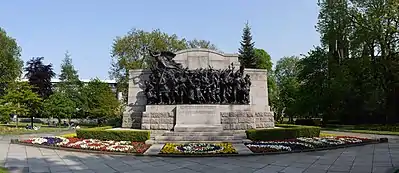Northumberland Fusiliers Memorial
The Response 1914 (also known as the Northumberland Fusiliers Memorial) is a war memorial in the public gardens to the north of the Church of St Thomas the Martyr in Barras Bridge, Newcastle upon Tyne, and to the west of Newcastle Civic Centre. Designed by Sir William Goscombe John, the memorial was commissioned by Sir George Renwick, 1st Baronet, and unveiled in 1923. It primarily commemorates the Territorial Army "Pals" battalions of the Northumberland Fusiliers raised by the local Chamber of Commerce in late 1914 for service in the First World War, which became known as the "Commercials". It also commemorates the safe return of Renwick's five sons from service in the war, and his 50 years in business as a ship-owner (he was also elected as the Member of Parliament for Newcastle-upon-Tyne and then Newcastle upon Tyne Central on three occasions between 1900 and 1922).
| The Response 1914 | |
|---|---|
| United Kingdom | |
 | |
| For the Kitchener's Army "Pals" battalions of the Northumberland Fusiliers raised in World War I | |
| Unveiled | 5 July 1923 |
| Location | 54.9786°N 1.6128°W |
| Designed by | William Goscombe John |
| |
| Official name | The Response 1914 |
| Designated | 17 December 1971 |
Listed Building – Grade I | |
| Official name | The Response 1914 |
| Designated | 28 October 2014 |
| Reference no. | 1186201 |
The memorial was designed by Sir W. Goscombe John,[1] who also designed the Port Sunlight War Memorial. It has a large base of Shap granite, with three steps up to a rusticated plinth and screen wall. A large bronze statue group on one side was founded by AB Burton at the Thames Ditton Foundry of Thames Ditton; the group includes many figures, some marching along with two drummer boys, while others say goodbye to their loved ones, with flags above, and an angel blowing a trumpet. The scene recalls the mobilisation of the 5th Northumberland Fusiliers in April 1915, and their march down the Great North Road through Newcastle to Newcastle railway station.[1] To the rear, the granite is formed into pylons at either end, with three figures carved into the granite: St George in the centre, supported on a bracket formed from two seahorses (the supporters in the arms of Newcastle), with the arms of Newcastle and Gateshead to either side, and then two soldiers in the uniform of the Northumberland Fusiliers: one from the First World War to the right, and one from the founding of the regiment in 1674 to the left.[1]
An inscription to the front reads Non sibi sed patriae (Latin for 'Not for himself, but for his country'), followed by the name of the sculpture, 'The Response 1914'. On the rear face, inscriptions read Quo fata vocant (Latin for 'Whither the fates call'), the motto of the Northumberland Fusiliers, and:
To commemorate the raising of the B Company 9th Battalion and the 16th, 18th and 19th Service Battalions, Northumberland Fusiliers, by the Newcastle and Gateshead Chamber of Commerce August–October 1914
The gift of Sir George Renwick BT DL and Lady Renwick
MCMXXIII
The memorial was the gift of Sir George and Lady Renwick and unveiled on 5 July 1923 at a ceremony attended by the Prince of Wales (later Edward VIII). After restoration, it was rededicated on 25 October 2007 in the presence of Prince Philip, Duke of Edinburgh and descendants of the Renwick family.[1] It became a listed building in 1971[2] and was advanced to Grade I listed status in October 2014.[3]
_-_geograph.org.uk_-_1766135.jpg.webp) Detail
Detail.jpg.webp) Rear elevation
Rear elevation Setting beside Newcastle Civic Centre
Setting beside Newcastle Civic Centre
References
- Henderson, Tony (10 November 2014). "Grade I listing boost for Newcastle war memorial on the eve of Armistice Day". Evening Chronicle. Newcastle upon Tyne: Trinity Mirror. Retrieved 1 February 2017.
- Historic England (28 October 2014) [17 December 1971]. "Details from listed building database (1186201)". National Heritage List for England. Retrieved 23 October 2015.
- "First World War Memorials Honoured" (Press release). English Heritage. 10 November 2014. Retrieved 30 April 2020 – via Historic England.
External links
| Wikimedia Commons has media related to The Response, Newcastle upon Tyne. |
- Entry on the War Memorials Register maintained by the Imperial War Museum